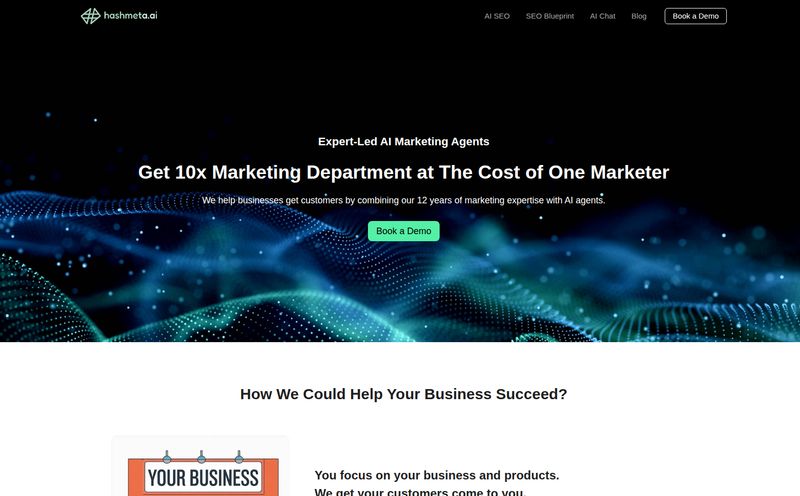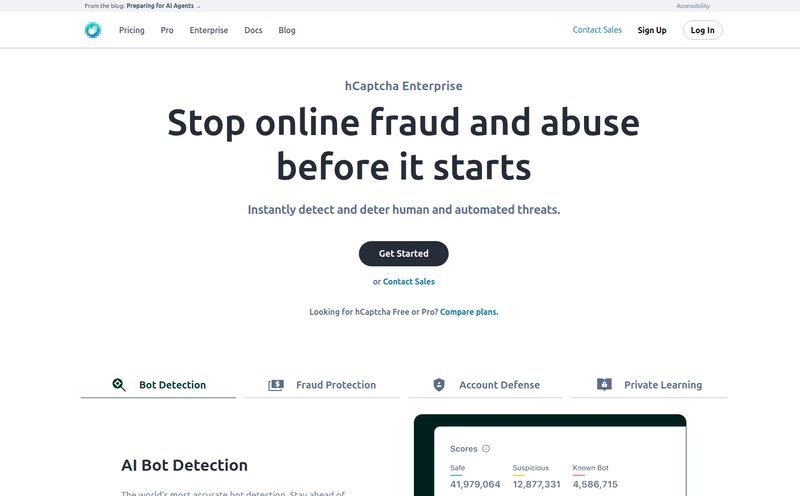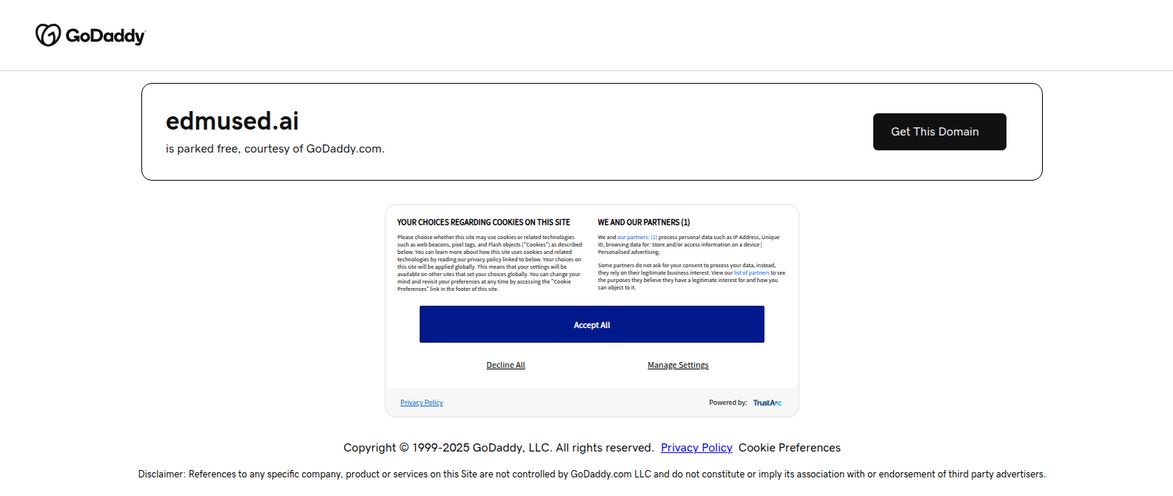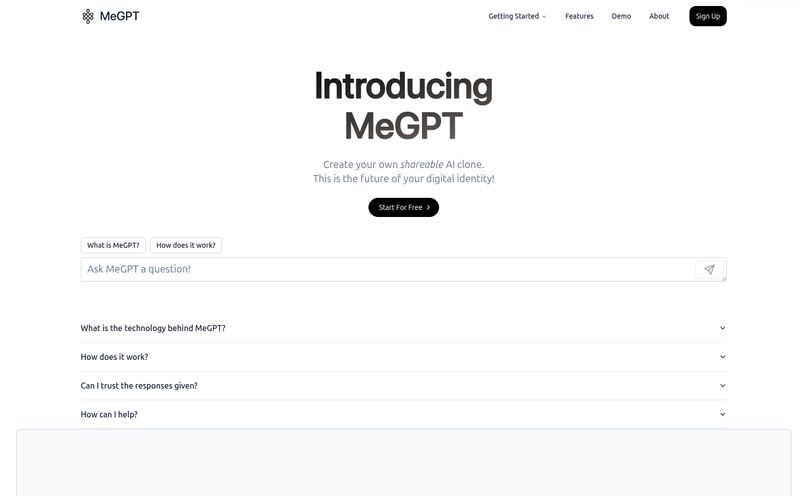The air in the consulting world has been thick with... well, panic. Every other week, there's a new headline about some AI that can write a business plan, debug code, or draft a marketing strategy. For those of us who've built a career on our hard-won expertise, it feels a bit like hearing footsteps in a dark alley. Is that a client coming with a new project, or a robot coming for your job?
I've been in the SEO and traffic game for years, and I've seen countless “next big things” come and go. So when another AI platform pops up, my default setting is skepticism. But every now and then, something catches my eye because it’s not trying to do the same old thing. It’s trying to change the game entirely.
That's the vibe I get from Innovation Algebra. Instead of positioning AI as a replacement for human experts, they're framing it as a force multiplier. A tool not to make you obsolete, but to make you scalable. It’s an interesting premise, so I decided to pull back the curtain.
So, What Is Innovation Algebra, Really?
Forget the generic, jack-of-all-trades AI models we've all been playing with. Innovation Algebra is something different. At its core, it's a platform that connects businesses needing specialized solutions with the distilled knowledge of top-tier human experts.
How? It allows experts—consultants, strategists, analysts, you name it—to essentially bottle their secret sauce. You take your unique frameworks, your decision-making processes, and your years of experience, and you work with them to build what they call an “Expert Model.”
Think of it like this: You’re a master chef known for a specific, complex sauce. You could spend your whole life making it one pot at a time. Or, you could meticulously document the recipe, the technique, the feel of it, and build a perfect machine that can replicate it flawlessly, on demand. You’re not replaced; your creation can now be everywhere at once. That's the core idea here. It’s not about artificial intelligence; it’s about amplified intelligence.
The Big Problem with Generic AI (and Why This Is Different)
We’ve all tried it. You ask a large language model to devise a go-to-market strategy for a niche B2B product. It spits out a beautifully formatted, completely generic, and ultimately useless document. It’s a mile wide and an inch deep. It lacks nuance, context, and the scars of experience that inform all great strategies.
This is where Innovation Algebra claims to break the mold. Their tech isn't trained on the entire internet; it's trained by you.
Meet "Identic AI": Your Digital Apprentice
The magic behind the curtain is something they call Identic AI. The name itself is a giveaway. It’s designed to capture the identity of an expert's thinking process. It’s not just scraping data; it's learning your specific methodologies and decision-making logic. This AI model becomes a digital version of your professional brain—a context-aware model that thinks and behaves like an expert because it was taught by one.
It’s less of a know-it-all robot and more of a digital apprentice that you’ve personally trained to perfection. And because it's your apprentice, it works to protect your most valuable asset...
How Innovation Algebra Works for Experts and Consultants
Okay, this is the part that probably matters most to my fellow consultants. How does this actually work, and why would you entrust your life's work to a platform?
From Your Brain to a Scalable Asset
The journey starts with you. The platform is built to help you deconstruct and digitize your expertise. This isn't just a simple Q&A. It's a structured process where you imprint your knowledge into your own proprietary AI model, or as they call it, an “EMgen” (Expert Model Generator). This EMgen can then be deployed to generate client-specific solutions, reports, and automated workflows. Suddenly, you're not just selling your time by the hour. You're selling a repeatable, scalable solution powered by your unique insight. You can serve more clients, generate revenue while you sleep, and build a legacy that isn't tied to your personal bandwidth. It's a shift from being a service provider to being the architect of a service product.
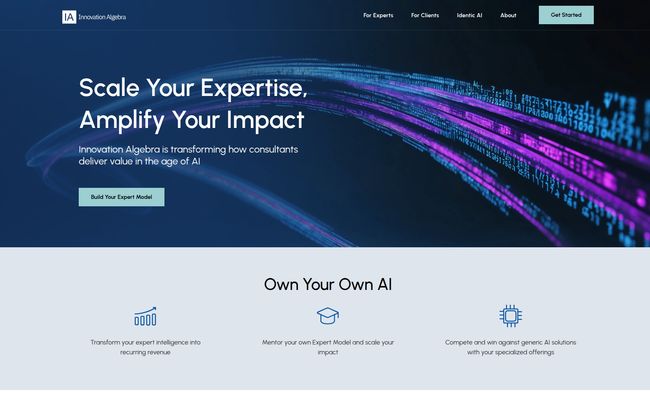
Visit Innovation Algebra
Protecting Your Secret Sauce (The IP Question)
This was my first and biggest question. If I pour my expertise into an AI, who owns it? Am I just training my replacement? Innovation Algebra seems to have anticipated this fear. A huge part of their pitch is the protection of your intellectual property. The “Identic AI” is designed as a black box that learns your methods without exposing them. Your knowledge is the fuel, but your specific formulas and frameworks remain yours. This is a critical distinction. It means you can scale your impact without broadcasting your trade secrets to the world—or worse, a competitor.
What's in It for the Clients?
Let's flip the coin. Why would a business use this? Because they get the best of both worlds. They get the speed, efficiency, and on-demand nature of an AI tool, but with the depth and proven methodology of a seasoned human professional. Instead of paying hefty retainer fees for a traditional consultancy, a company can access a specific Expert Model to solve a specific problem—cost-effectively and instantly.
They’re not just getting a generic AI answer. They're getting access to a curated network of elite thinking, tailored to their exact challenge. It's like having a roster of top consultants on speed dial, ready to deliver proven solutions 24/7.
Let's Talk Brass Tacks: The Tech and the Price
The engine driving all this is called The EMgen – Service-as-a-Software. It's the technology that allows an expert to 'imprint' their knowledge and generate those custom deliverables. It's a fancy way of saying it's the bridge between human genius and software-driven scale.
Now, the million-dollar question: what does it cost? Well, you won’t find a neat little pricing table on their website, and honestly, that’s not surprising. This isn't a $10/month subscription tool. This is a high-value B2B platform for building scalable assets. The pricing is likely customized based on the complexity of the model being built and the scope of its use. You'll have to get in touch with them for a demo and a quote. It's an enterprise play, and the investment probably reflects the potential for significant ROI.
My Honest Take: Is It Worth The Hype?
Like any tool, it’s not a magic wand. There are definite upsides and some things to consider.
- The Good Stuff: The ability to productize your expertise is a game-changer. It offers a path to break free from the hours-for-dollars trap. For businesses, getting on-demand access to specialized, proven methodologies without the traditional consulting overhead is incredibly appealing. And the emphasis on IP protection is, frankly, the only way a model like this could ever work. It shows they get their target audience.
- The Reality Check: This isn't going to be a simple sign-up-and-go process. Building a robust Expert Model will undoubtedly require a significant investment of your time and effort upfront. There's a learning curve. Plus, the success of any solution is entirely dependent on the quality of the expert who built it. A mediocre expert will just build a mediocre AI. Garbage in, garbage out, as they say.
Frequently Asked Questions (FAQ)
- What exactly is an "Expert Model"?
- An Expert Model is an AI application built on Innovation Algebra's platform. It's trained using the specific knowledge, frameworks, and decision-making processes of a single human expert to solve a particular type of problem.
- How does Innovation Algebra protect my intellectual property?
- Their proprietary "Identic AI" is designed to learn your methods and logic without making your core IP transparent or replicable. Your knowledge powers the model, but the underlying 'recipe' remains protected and owned by you.
- Is this for solo consultants or just big firms?
- While it seems geared towards high-level expertise, the model could benefit anyone with a proven, repeatable process—from a successful solo consultant looking to scale to a large firm wanting to standardize its methodologies across the organization.
- How is this different from just using ChatGPT?
- ChatGPT is a generalist trained on the broad internet; it provides wide but shallow information. An Expert Model from Innovation Algebra is a specialist trained on a single expert's deep knowledge; it provides narrow but profound solutions for specific business challenges.
- Do I need to be a programmer to build an Expert Model?
- No. The platform is designed for experts, not coders. The process involves mentoring the AI and imprinting your knowledge through their guided system, not writing code yourself.
Final Thoughts
So, is Innovation Algebra the definitive answer to the AI panic? Maybe. It's one of the most interesting approaches I've seen because it places value back on the human. It suggests a future where AI doesn't replace experts but becomes the ultimate tool in their arsenal, allowing them to amplify their impact far beyond what was ever possible.
It’s not for everyone, and it’s not a quick fix. It requires real expertise to be valuable. But for the right consultant or business, it might just be the bridge to the next era of delivering value. It’s a compelling vision: stop competing with AI and start putting it to work for you. And in this crazy, fast-moving market, that sounds like a pretty smart move to me.
